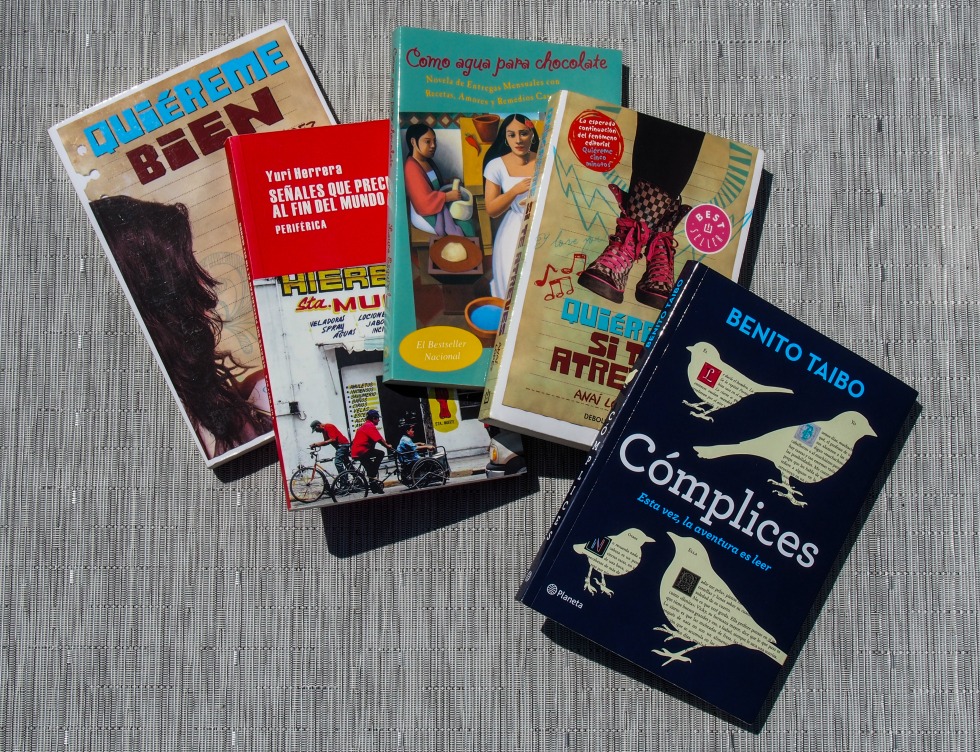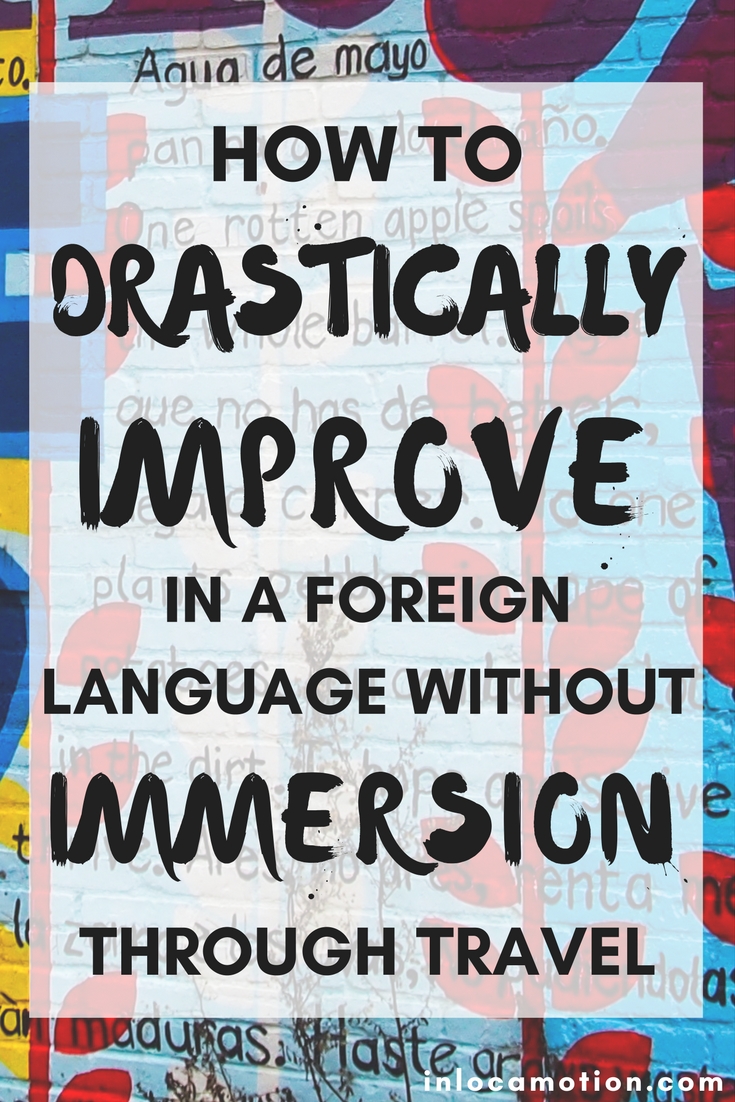
Grow, nourish, and thrive… all good reasons to learn languages! Especially when it helps you read beautiful, bilingual murals such as this one in Harrisburg, Pennsylvania!
I’m a huge lover of languages, and a big proponent of language learning in conjunction with travel. Language learning, even just the basics, helps us connect to cultures and people in a much more profound way than if we only communicate in our native language. I guarantee you that language learning will improve your travels. It’s also good for the brain. Language learning helps improve memory and delays the onset of certain cognitive disorders, such as Alzheimer’s.
However, language learning is also a daunting task. If you’ve never learned a foreign language, where do you even start? If you are more advanced in a language, what is the best way to maintain the language, even when you don’t necessarily have the opportunity to speak it on a regular basis? After all, if you don’t use it, you lose it. I was nervous that my Spanish would take a hit after I graduated college and stopped having access to regular Spanish classes. However, by implementing the tips that I present below, my Spanish has actually drastically improved in spite of no longer taking classes. I’m implementing a similar strategy with Arabic and seeing great results. So I can attest to this strategy, and hopefully you find it helpful as well. By the way, the majority of the tips that I present below are free!
Just a note: below I use “beginner” to refer to someone who is pre-conversational (i.e. still learning grammar, verb conjugation, basic vocabulary, etc.), “intermediate” to refer to one who is conversational but not fluent, and “advanced” to refer to someone who is fluent.
Also: not all of the tips on this list will apply for folks who are learning sign language… but some definitely will! Otherwise, here are some sign language specific tips.
[This post may contain affiliate links. If you make a purchase through one of these links, I will earn a commission at no extra cost to you!]
Engage with popular culture
Read books
Reading is by far the best way to build a strong vocabulary and see grammar in action. I strongly recommend looking for books written originally in the writer’s native language (as opposed to reading translations). While reading a translation is better than nothing, reading a book in the native language means that you will pick up regional vocabulary and place-specific cultural nuances. Think about it: if you’re looking to learn German and understand more about German culture, is reading Harry Potter in German really the best way to go about it?
Beginners should look for children’s books and young adult fiction. Intermediate/advanced learners should read whatever they can get their hands on: novels, nonfiction, how-to books, and more. See if your local library has a foreign language section. Also, many major cities have foreign language bookstores; otherwise, most books can be found online.

Reading novels by Mexican authors not only helped me improved my Spanish, but also taught me more about Mexican culture and slang
(Pictured above for those interested in reading Mexican fiction: Quiéreme bien and Quiéreme si te atreves [sequals to Quiéreme cinco minutos by Anai López], Señales que precederán al fin del mundo by Yuri Herrera, Como agua para chocolate by Laura Esquivel, and Cómplices by Benito Taibo).
Watch TV shows and movies
Watching TV shows and movies has helped me improve so much in Spanish in the past few years, all from the comfort of my couch. Do you have Netflix, Hulu, or some other streaming program? See what TV shows and movies are available in the language that you’re learning (that are originally produced in that language). Similarly to reading, watching a dub is not the best way to learn regional vocabulary or cultural nuances. Beginners: try watching shows and movies in your foreign language with English (or other) subtitles to train your ear and begin to associate words. Intermediate/advanced learners: use closed caption subtitles in the language that you’re learning, if available; otherwise try without subtitles.
Listen to music
Music is a great way to connect to different countries and cultures, and it’s also an accessible resource for language learners of all levels! Get on YouTube and start searching, and you’re bound to find a plethora of music from all around the world. Language learners of all levels can use music to train their ear. Also, looking up lyrics and singing along is a great way to learn vocabulary and work on pronunciation. For example: for years I couldn’t pronounce the rolled ‘r’ in Spanish… until I started unapologetically singing along to songs in Spanish in the car. Little by little, I trained myself (first through singing, then by speaking) to pronounce this sound.
Listen to podcasts
Podcasts are a great way to learn languages, especially for the language-loving commuter! As with music, podcasts are a great way to train your ear. Plus, podcasts are completely free – just download them and go. Beginners can look specifically for language-learning podcasts. Intermediate/advanced language learners can listen to podcasts produced by native speakers for native speakers. This is a great way to challenge yourself (listening comprehension without visual cues can be difficult for non-native speakers), learn different accents and vocabulary, and gain some insight into the culture from which the podcast is produced.
Read the newspaper
Reading the newspaper is another great resource, and it’s especially helpful to learn more about the current events of the country or countries where the foreign language is spoken. Folks of all levels can read the newspaper. While it may be a challenge for beginners, the news is typically written clearly and concisely, without too many idiomatic expressions, making it an easier resource than reading books. Get online and find yourself some articles!
Study up
Apps
There are a lot of free apps that folks can use for language learning, such as Duolingo, Memrise, and more. I think that apps are a great resource for practicing the language at various levels. However, most apps don’t actually teach you grammar, so they should be used as a supplement to other resources. Apps are especially good for folks at the beginner and intermediate levels, as well as for folks who like to study up on the go.
Speaking of apps, I’ve recently started using Quizlet (a flashcard app) to make Arabic flashcards, and I really like it. It’s super easy to use and I’ve been able to make all sorts of decks. Perfect for practicing vocabulary while on the subway or waiting for the bus. Otherwise, there are a number of other free flashcard apps, which I strongly recommend for folks at the beginner and intermediate levels to study vocabulary on a regular basis.

My tiny notebook for on-the-go language learning. Full of words in Spanish and Arabic. It’s small, light, and super convenient.
Take notes
For folks who don’t like studying from their phones, why not put pen to paper as you learn throughout the day? I carry a small notebook around with me, and when I learn new words in the languages that I’m studying, I write them down. It’s a simple trick that folks at all levels can use to improve their vocabulary. Try one of these super compact notebooks – easy to carry in your pocket or bag, for note-taking and studying throughout the day.
Look for classes
If language classes are an option, I highly recommend taking classes. Language classes are especially valuable for beginners, because while yes, there are a ton of free resources out there, at the beginner level it can be really easy to teach yourself incorrectly. It is beneficial to work with an instructor who will correct your pronunciation and grammar, and answer your questions about the structure of the language.
For folks of all levels, look out for free languages classes at your local library. Also, in a few cities here in the United States I’ve found community colleges and community centers that offer a semester’s worth of language classes for less than $200. Obviously this is not a viable expense for everyone, but worth looking into if you have the time and the funds.
Seek community
Meetups
Meetups are a great way to practice your conversational skills while forming friendships. Look for local language exchanges or language specific meetups. Meetup.com is a great resource for this. I find meetups that are specifically for one language are better than language exchanges for all languages. While it’s fun to hear 20 different languages being spoken in one room, if you’re specifically looking to speak French you might have better luck at a French meetup. Language meetups are great for folks of all levels, and attendees tend to range from native speakers to absolute beginners.
Find a language exchange partner
Are you looking to learn Russian, and your Russian friend wants to practice their English? Well, why not sit down for an hour a week over a cup of coffee, chatting for 30 minutes in English and 30 minutes in Russian? Also, if you can’t meet face to face, you can look for conversation partners to practice with over Skype.
Try cultural activities
Getting involved in cultural activities related to language is a great way to meet native speakers and engage more with the culture behind the language. Attend heritage events in your city, and get involved in activities that have been exported from other countries. Interested in learning Japanese? Why not join an anime club? Learning Spanish? Try Latin dancing. There are so many ways to participate in cultural activities even outside of their country of origin. Plus, these activities tend to introduce you to folks from other countries, teach you about other cultures, and allow you to form friendships over shared interests.

Salsa dancers in Santa Monica, California. Every time I go salsa dancing I end up speaking a little (or a lot) in Spanish!
Make friends
Last but definitely not least, making friends who speak the language that you’re learning is probably the best way to drastically improve your language skills without traveling abroad. Obviously confirm with your friends before assuming it’s okay to practice with them, but if they are down to help you out, utilize your friends’ help! It’s so common for non-native speakers to feel shy or self-conscious trying to communicate in a foreign language, but pushing yourself over this hump (because I assure you, with time and practice you will get over this) is so important in achieving fluency. And who better with which to be vulnerable and tongue-tied than our friends, right? So speak to your friends in their native language, even if you can only get as far as, “Hi, how are you?”. Every little bit helps.
En fin
Language learning is a lot of work! We can’t just absorb languages like a sponge – achieving a conversational level (let alone fluency) requires a lot of time and effort, and we need to put in the work to see results. And even then, speaking, listening, and thinking in a foreign language does not always feel comfortable. So be kind to yourself throughout your language learning adventure! There will be some days in which you feel like you can’t even say your own name, and other days in which it feels easy and natural to express yourself. It’s all part of the process of language learning, and the uncomfortable moments are worth the many benefits that we get when we can communicate in a foreign language.
I hope you found these tips helpful! They are the closest that I have been able to come to experiencing language immersion without traveling to a country where the language is spoken. While travel isn’t a necessity for attaining fluency in a foreign language, it does help. That being said…. Stay tuned for more language learning tips, next time about how to maximize your language learning while abroad! Also, for some language learning travel inspiration, be sure to check out this experience of mine about speaking Spanish in Guatemala and how that allowed me to form cultural connections that I wouldn’t have been able to form otherwise. Also, don’t miss my wonder and awe speaking Arabic (and many other languages) in Morocco, or laugh at all my embarrassing mishaps learning Spanish in Spain. I hope you enjoy, and best of luck on your language learning journey!
There you have it! Everything I know about how learn and improve in a foreign language without traveling. What are your favorite ways to practice language while at home? What works for you and what doesn’t? What language(s) are you working on at the moment, or would like to learn in the future? Let me know in the comments below!










2 comments
There are so many ways out there for language immersion that a lot of people forget about. I’m learning Russian myself and only after a year of studying did I finally go to Moscow. Watching movies, listening to music and finding friends who speak the language all help a lot!
It’s so true! I’m glad that you’ve had success with Russian by exploring all these different avenues for language learning. And making friends is definitely a huge help. Thanks for reading and commenting, and best of luck with your Russian studies! 🙂